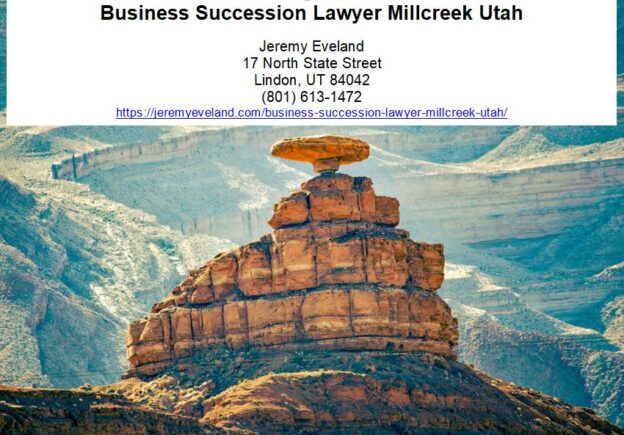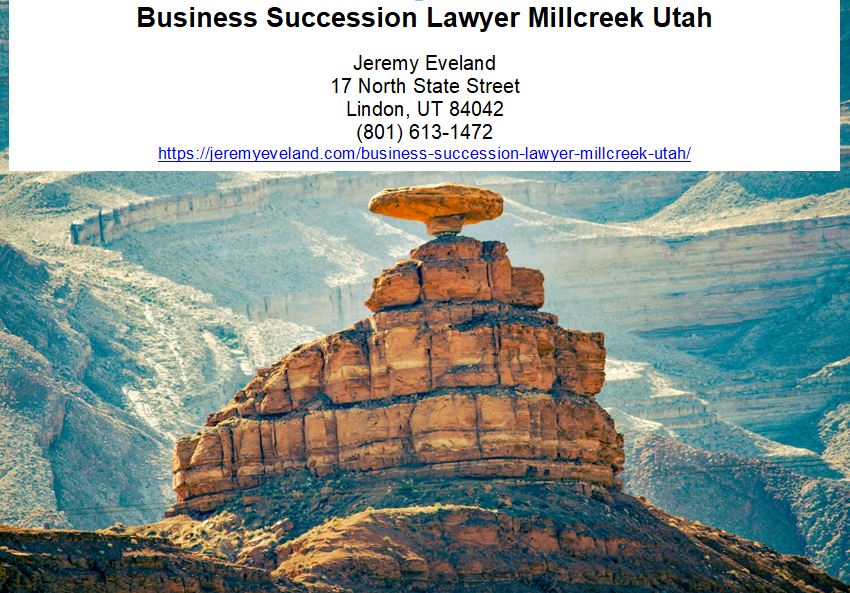Business Succession Lawyer Millcreek Utah
Millcreek, Utah is home to many businesses and entrepreneurs, and they all need the expertise of a business succession lawyer. A business succession lawyer is a legal professional who specializes in the area of business succession law. This type of law covers a variety of topics, including estate planning, business succession planning, transfer of ownership, asset protection, and taxation. A business succession lawyer in Millcreek, Utah can provide legal advice and services to business owners, entrepreneurs, and families in the area.
“Good things happen to those who hustle.” – Anais Nin
Good things (usually) don’t just fall into your lap, and there’s no use waiting around and hoping they will. Want to start a side hustle? Stop thinking and talking about it. Get started today, good things will happen when you work hard for them—and position yourself to identify which opportunities you can take advantage.
“The dream is free. The hustle is sold separately.”
It doesn’t cost you anything to dream—time, money, or hard work. Hustle, on the other hand, costs all of that.
“I am deliberate and afraid of nothing.” – Audre Lorde
Adopt a deliberate mindset, and do not be afraid to take chances. This motivational quote is a reminder that if you want to be successful, you will need to work like your life (style) depends on it.
“I began to realize how important it was to be an enthusiast in life. If you are interested in something, no matter what it is, go at it full speed ahead. Embrace it with both arms, hug it, love it, and above all become passionate about it. Lukewarm is no good. Hot is no good either. White hot and passionate is the only thing to be.” – Roald Dahl
When in doubt, don’t half-ass it. You can’t afford to.
“Remembering that you are going to die is the best way I know to avoid the trap of thinking you have something to lose. You are already naked. There is no reason not to follow your heart.” – Steve Jobs
It’s a bit nihilistic, but it’s also pretty damn motivating. What do you really have to lose in this life? Failure in business won’t kill you, and you’ll be able to get back into the game if you have the drive. Pick yourself up and hustle again.
Business succession lawyers in Millcreek, Utah can provide legal services to business owners, entrepreneurs, and families in the area. They can provide advice on how to structure a business entity, such as a sole proprietorship, partnership, limited liability company (LLC), or corporation. They can also provide advice on how to draft a valid succession plan, which is the document that will outline the ownership and control of the business. They can also provide advice on how to transfer ownership and control of a business in the event of a death or disability.
“You can’t use up creativity. The more you use, the more you have.” – Maya Angelou
The best way to get your side hustle moving is to flex those creative muscles. No matter how small or seemingly insignificant. The act of exercising your creative muscle will help you perfect your craft and become even better. Create. Create. Create.
“I always did something I was a little not ready to do. I think that’s how you grow. When there’s that moment of, ‘Wow, I’m not really sure I can do this,’ and you push through those moments, that’s when you have a breakthrough.” – Marissa Mayer
Never stop challenging yourself. The day you do, you’re falling behind. Do things you’re a little not-ready-to-do yet. That’s how you grow and have breakthroughs.
“Never let go of that fiery sadness called desire.” – Patti Smith
If you lose your ambition, you’ve lost the drive to succeed. Keep that desire to be something greater burning inside of you, and bookmark this motivational quote—it’ll get you through the tough times that lie ahead.
“Challenges are gifts that force us to search for a new center of gravity. Don’t fight them. Just find a new way to stand.” – Oprah Winfrey
If you feel like your side hustle is hitting a roadblock, reframe it: It’s adjusting its center of gravity. This motivational quote is inspiration to constantly adapt in the face of challenges. Any time you feel procrastination creeping in, strive to be aware of it and treat it like a plague—stop procrastinating the moment you realize you’re doing it and find a reward for completion of the milestone.
“What would you do if you weren’t afraid?” – Sheryl Sandberg
Take a minute to think about that one. If truly nothing was stopping you, nothing in your way, nothing to be afraid of, what would you do? This is an inspiration to do exactly that. Right now. What are you waiting for? Should you quit your job to pursue your side project that’s gaining momentum? Well, maybe. You tell me. What are you afraid of?
“It is not true that people stop pursuing dreams because they grow old. They grow old because they stop pursuing dreams.” – Gabriel García Márquez
Your passion for your dream will keep you young and invigorated. This is a reminder not to fall into the trap of contentment, laziness, or stagnation. Find a business idea that helps you achieve your most meaningful goals in life—and keep pushing towards it until you’re there.
Business succession law is an important area of the law that business owners, entrepreneurs, and families should have a basic understanding of. This type of law deals with the transfer of ownership and control of a business from one generation to the next. This law is especially important for businesses that are structured as partnerships or limited liability companies (LLCs). Business succession law also covers estate planning, which is the legal process of managing and protecting the assets of an individual or family.
“I don’t count my sit-ups; I only start counting when it starts hurting because they’re the only ones that count.” – Muhammad Ali
Going through the routine isn’t good enough, and more importantly, it’s not going to keep pushing you to grow. This is a reminder that the only way to get to the zone where you’re growing, and pushing the limits, is to continue to push yourself beyond your comfort zone.
“One, remember to look up at the stars and not down at your feet. Two, never give up work. Work gives you meaning and purpose and life is empty without it. Three, if you are lucky enough to find love, remember it is there and don’t throw it away.” – Stephen Hawking
“Innovation distinguishes between a leader and a follower.” – Steve Jobs
Are you imitating or innovating? Keep asking yourself that as you pursue your work, and use this motivational quote to push yourself in the right direction and strive to be a leader.
“I have not failed. I’ve just found 10,000 ways that won’t work.” – Thomas Edison
No one has ever done anything important (perfectly) on the first try—failing once or even dozens of times—should never mean failing forever. When you fail with a big project, don’t land a new client you’ve been pitching, under-deliver on the results you were expecting, or get down about a cold email that went unanswered, always limit the amount of time you allow for being discouraged, to no more than an afternoon. After that, it’s time to dust yourself off, figure out where you went wrong, and start hustling again.
“Do not go where the path may lead, go instead where there is no path and leave a trail.” – Ralph Waldo Emerson
It’s easier to follow established career paths and societally acceptable professions, but if that’s not going to make you the happiest version of yourself—then it’s your responsibility to deviate from the path. Welcome to entrepreneurship. Leaders carve out their own path instead of following the masses and you should inspire others to follow you. You can’t expect people to flock to your cause; give them a compelling reason that they won’t be able to ignore you any longer.
“You gotta run more than your mouth to escape the treadmill of mediocrity. A true hustler jogs during the day, and sleepwalks at night.” – Jarod Kintz
Basically, put your money where your mouth is. Don’t just tell everyone about that great idea of your, those dreams of owning your own business—this is a reminder to actually make daily progress towards bringing it to life. Learn the skills you’ll need to excel, take the right online business courses to level up your game, network with the right people, find mentors. Don’t make excuses—hustle hard.
“Lift up the weak; inspire the ignorant. Rescue the failures; encourage the deprived! Live to give. Don’t only hustle for survival. Go, and settle for revival!” – Israelmore Ayivor
If you’re doing what you do for just you, you’re probably doing it wrong. Strive to do better, give back, and inspire others. This is a reminder that there’s plenty of room for generosity in the hustle. And when you do pay it forward, the benefits you will experience come back tenfold.
“Hustle until you no longer need to introduce yourself.” – Anonymous
No one asks Bill Gates who he is, use this to achieve greatness—remind yourself of that and you can’t lose in the long run.
“Things work out best for those who make the best of how things work out.” – John Wooden
Success almost never comes in a neat package. This motivational quote will remind you to make the best of what you have, and what happens even if you fail.
“If you are not willing to risk the usual, you will have to settle for the ordinary.” – Jim Rohn
Mediocre is easy. It takes work to become truly great. Learn to love the hustle. If you want mediocrity, invest in a low risk, low return lifestyle.
You want to fulfill your dreams as an entrepreneur? You’re going to have to hustle a lot.
Business Succession Lawyer Millcreek Utah Consultation
When you need legal help with a business succession in Millcreek Utah, call Jeremy D. Eveland, MBA, JD (801) 613-1472.
Jeremy Eveland
17 North State Street
Lindon UT 84042
(801) 613-1472
Recent Posts
Business Transaction Lawyer Salt Lake City Utah
The Utah Uniform Partnership Act
The 10 Essential Elements of Business Succession Planning
Business Succession Lawyer Salt Lake City Utah
Business Succession Lawyer West Jordan Utah
Business Succession Lawyer St. George Utah
Business Succession Lawyer West Valley City Utah
Business Succession Lawyer Provo Utah
Business Succession Lawyer Sandy Utah
Business Succession Lawyer Orem Utah
Business Succession Lawyer Ogden Utah
Business Succession Lawyer Layton Utah
Business Succession Lawyer South Jordan Utah
Business Succession Lawyer Lehi Utah
Business Succession Lawyer Millcreek Utah
Business Lawyer Salt Lake City Utah
Millcreek, Utah
|
Millcreek, Utah
|
|
|---|---|
|
City
|
|

Western Governors University in Millcreek
|
|

Location in Salt Lake County and the state of Utah.
|
|
| Coordinates: 40°41′10″N 111°51′50″WCoordinates: 40°41′10″N 111°51′50″W | |
| Country | United States |
| State | Utah |
| County | Salt Lake |
| Incorporated | December 28, 2016 |
| Named for | Mill Creek |
| Government
|
|
| • Mayor | Jeff Silvestrini |
| • Councilman – Dist. 1 | Silvia Catten |
| • Councilman – Dist. 2 | Dwight Marchant |
| • Councilman – Dist. 3 | Cheri M. Jackson |
| • Councilman – Dist. 4 | Bev Uipi |
| Area | |
| • Total | 12.77 sq mi (33.07 km2) |
| • Land | 12.77 sq mi (33.07 km2) |
| • Water | 0.00 sq mi (0.00 km2) |
| Elevation
|
4,285 ft (1,306 m) |
| Population | |
| • Total | 63,380 |
| • Density | 4,963.19/sq mi (1,916.54/km2) |
| Time zone | UTC−7 (Mountain (MST)) |
| • Summer (DST) | UTC−6 (MDT) |
| ZIP codes |
84106, 84107, 84109, 84117, 84124
|
| Area code(s) | 385, 801 |
| FIPS code | 49-50150[3] |
| GNIS feature ID | 1867579[4] |
| Website | millcreek |
Millcreek is a city in Salt Lake County, Utah, United States, and is part of the Salt Lake City Metropolitan Statistical Area. The population as of the 2020 Census was 63,380.[2] Prior to its incorporation on December 28, 2016, Millcreek was a census-designated place (CDP) and township.
[geocentric_weather id=”2bf51064-0e85-47bf-95dc-86245ac4e2a4″]
[geocentric_about id=”2bf51064-0e85-47bf-95dc-86245ac4e2a4″]
[geocentric_neighborhoods id=”2bf51064-0e85-47bf-95dc-86245ac4e2a4″]
[geocentric_thingstodo id=”2bf51064-0e85-47bf-95dc-86245ac4e2a4″]
[geocentric_busstops id=”2bf51064-0e85-47bf-95dc-86245ac4e2a4″]
[geocentric_mapembed id=”2bf51064-0e85-47bf-95dc-86245ac4e2a4″]
[geocentric_drivingdirections id=”2bf51064-0e85-47bf-95dc-86245ac4e2a4″]
[geocentric_reviews id=”2bf51064-0e85-47bf-95dc-86245ac4e2a4″]































